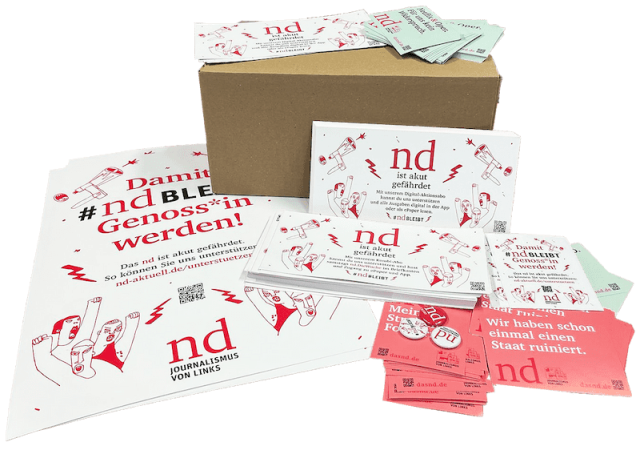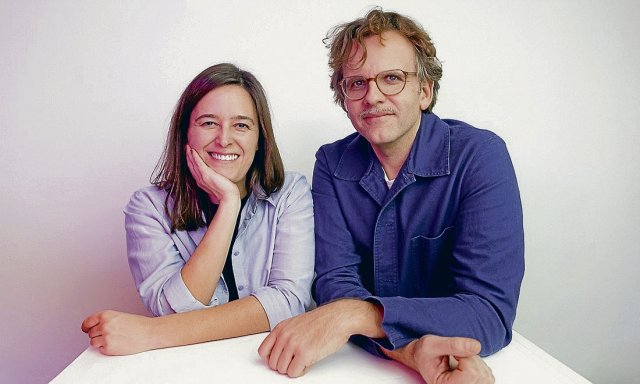Christoph Gröner studied in Munich, Venice and Salamanca. Since 2012 he has been responsible for the New German Cinema section at the Munich Film Festival, from 2019 to 2023 he was artistic director and since 2023 he has been festival director and managing director of the festival. Julia Weigl has been working as a freelance journalist, author, translator and presenter since 2014. From 2015 to 2019 she worked in the press department and editorial team at the Munich Film Festival. From 2019 to 2023 she curated the international film program and since 2023 she has been the festival’s artistic co-director.
Photo: Bojan Ritan
Ms. Weigl, you have been at the Munich Film Festival for ten years, Mr. Gröner, you have been part of the film festival team for 20 years. What principles shape your joint artistic direction?
Weigl: We believe that as a team we can best embody dialogue. And that’s what the festival is all about – starting a conversation based on the individual films, really living cinema as a social experience, as togetherness. We offer lots of panels, discussions and film discussions – conversation and exchange are at the heart of us as a premiere festival in order to give space to many different voices.
Gröner: With two of us we are simply faster. By exchanging ideas at eye level, we are something like our own think tank. For this edition, we have introduced a lot of innovations with a fantastic team: large new venues or a different structure of the competitions and our program series, for example.
One of your first official acts was a trip to New York. How is the Munich Film Festival perceived abroad?
Gröner: On the other side of the Atlantic there is a certain form of nostalgia that is associated with incredibly great experiences at the Munich Film Festival in the 80s and 90s. So when we came to New York, a lot of doors opened for people who started back then and are now in management positions, in distribution or at talent agencies. And we have made new friends: Rajendra Roy is the Museum of Modern Art’s chief curator for the film section and is part of our competition jury this year.
Weigl: American independent cinema is very important to us. Three years ago we launched the experimental Cine Rebels series to show films that are sadly too rare in regular cinemas. The calm but provocative documentary “Realm of Satan” about the banal everyday life of people in the Church of Satan, “Los Hiperbóreos” about esoteric Hitlerism or the Gaga film “Doppelgängers³”, for example. This is an absolute indie gem and the premiere with director Nelly Ben Hayoun-Stépanian is crazy. She wants to come to the premiere with one of her doppelgangers and then choose the best doppelgangers in the audience.
What do you think about the fact that the Munich Film Festival is also treated as the Bavarian Cannes?
Gröner: I would like to answer the question substantively. We have 14 films from Cannes in our luggage. That’s what people expect from us, but now we also have great titles from Tribeca and we’re sharing world premieres. We share “Xoftex” with Karlovy Vary and “Another German Tank Story” with the Shanghai International Film Festival. We’ve been excited about the concept of split premieres for years because these films, even though they’re fantastic, have a hard time getting seen. We give a film like this the greatest possible attention. It is also more sustainable if you don’t have a guest from North America or Asia come twice, but plan a premiere together with another festival. As a festival, we are most successful when we fill it with lots of world, international and European premieres, but present them in a casual way. This is its own concept and absolutely attracts today’s world stars.
nd.DieWoche – our weekly newsletter

With our weekly newsletter nd.DieWoche look at the most important topics of the week and read them Highlights our Saturday edition on Friday. Get your free subscription here.
Why did you bring back the CineCoPro co-production award from 2019?
Weigl: At the Munich Film Festival we have been highlighting creative voices from Germany for many years with the New German Cinema and New German Television series. And now German co-productions again – with the highest prize for German co-productions. You can say: Our program is now complete again – and that fits with our self-image as the number one platform for German filmmaking. Personally, I’m particularly looking forward to the German-Canadian co-production “Rumours” by Guy Maddin with Cate Blanchett and Alicia Vikander, who stumble through the forest as G7 world politicians, while the audience sits in our open air in the forest and by the lake.
That sounds very idyllic.
Weigl: That’s not what the film is (laughs). But as the Munich Film Festival, we are a summer festival where you can network in the beer garden and on the Isar. This is also reflected in the new design. Our carpet is no longer red, but turquoise like the Isar. We want to attract our guests to Munich with their heartfelt projects and discover new talents. A prominent example is Lily Gladstone, who spent almost a whole week in Munich in “Quantum Cowboys” two years ago, completely incognito, and this year won a Golden Globe for her role in “Killers of the Flower Moon.”
Gröner: We don’t want to copy A-festivals, but see ourselves as a festival of discovery, even when it comes to discovering a different side to stars such as Kate Winslet. This year, as a producer, she is presenting her film “The Photographer” to us. In addition, for the first time in Germany we are showing a selection of photographs by the actress Jessica Lange, who is still completely unknown in Germany as a photo artist, and are celebrating the screen premiere of her new film “The Great Lillian Hall” with her. I’m really looking forward to that.
Weigl: But beyond all enthusiasm and optimism, we also have very political films in our program such as “Führer und Seducer”, “Münter & Kandinsky”, “The Investigation” and “Tatami”, which depict, process and comment on the worlds we live in. This year we are also devoting a thematic focus to Ukraine.
The film festival opens with “Two to One” from the New German Cinema series. Why do you focus on German and not international cinema?
Weigl: It was a gift for us this year that Jessica Lange agreed so early. When Kate Winslet came along and a very idiosyncratic homage with Shin’ya Tsukamoto, international cinema was well covered for us. We really wanted to give German film a big platform. “Two to One” with Sandra Hülser and Ronald Zehrfeld is the perfect mix of national cinema and international standards.
Gröner: The film is a wonderful comedy, but takes the characters seriously. It is a film about the fact that one is not completely at the mercy of the neoliberal mechanisms, but can act in solidarity with one another. In this respect, we find it to be the perfect opening film.
#ndstays – Get active and order a promotional package

Regardless of whether it is pubs, cafés, festivals or other meeting places – we want to become more visible and reach everyone who values independent journalism with an attitude. We have put together a campaign package with stickers, flyers, posters and buttons that you can use to get active and support your newspaper.
To the promotional package
